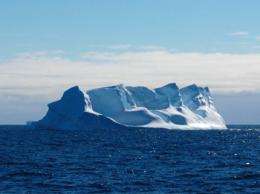Image credit: Trevor Williams.
Armadas of icebergs were probably not the cause of abrupt episodes of cooling in the North Atlantic over the past 440,000 years, according to new research published today in Nature.
Previous studies have suggested that pulses of icebergs may have caused cycles of abrupt climate change during the last glacial period by introducing fresh water to the surface of the ocean and changing ocean currents, which are known to play a dominant role in the climate of many of Earth's regions.
However, new findings by scientists at Cardiff University present a contradictory narrative and suggest that icebergs generally arrived too late to trigger marked cooling across the North Atlantic.
Abrupt climate change, characterised by transitions between warm and cold conditions across the North Atlantic, is a pervasive feature of the Late Pleistocene - the most recent period of repeated glacial cycles.
The occurrence of extremely cold conditions in the North Atlantic seems to have been linked to the dispersal of icebergs that have broken away from ice sheets bordering the North Atlantic. Yet to date there has been no consensus among climate scientists as to whether the breaking and dispersal of icebergs was a cause or a consequence of climate change.
A team of researchers from Cardiff University's School of Earth and Ocean Sciences used a sediment core retrieved from the North East Atlantic, just south of Iceland, to construct records of changing surface ocean temperature and the movement of iceberg debris over the last 400 thousand years.
"We found many examples of abrupt cooling events and many of these were paired with an increase in iceberg activity," said Dr Stephen Barker, who led the study. "However, crucially we found that in the majority of cases, icebergs appeared after cooling had occurred, meaning that icebergs arrived too late to have triggered cooling at this site - though may have have enhanced or prolonged these cold conditions.
"In fact our findings imply that abrupt cooling events were preceded by intervals of more gradual cooling, suggesting that the descent into colder conditions should be considered as a non-linear response to a more gradual change across the North Atlantic.
"We show that there is still much to learn about abrupt climate change. Specifically we have demonstrated that a fundamental idea on which many previous studies have been based needs to be reassessed. Our results suggest that alternative mechanisms need to be considered and that climate models need to be able to simulate these past changes if we are to have confidence in their ability to forecast future changes to the climate."
The researchers' conclusions are consistent with the findings of a ground-breaking study published in 1995, which pointed out that widespread breaking and dispersal of icebergs might be a consequence of climate change rather than the cause. Direct evidence in support of this theory, however, has largely been lacking until now.
In the next phase of their research, Dr Barker and his team will extend their investigations back to almost 2 million years. This will enable the team to reconstruct the nature of abrupt climate change throughout much of the Pleistocene period, yielding clues as to the influences of abrupt change on longer timescales.
More information: Nature, dx.doi.org/10.1038/nature14330
Journal information: Nature
Provided by Cardiff University























